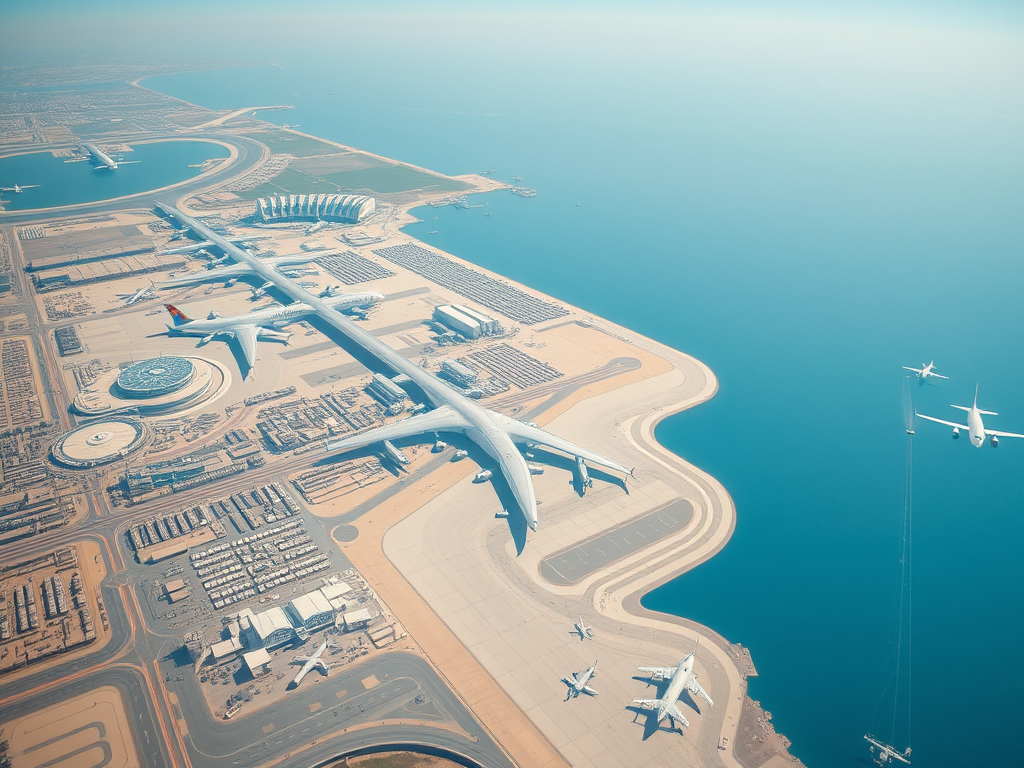Dubai, often referred to as the “City of Gold,” has emerged as a pivotal center for global trade, logistics, and supply chain management. The city’s strategic location at the crossroads of Europe, Asia, and Africa makes it an ideal hub for businesses looking to expand their reach across diverse markets. Its rapid development into a bustling metropolis has captivated the attention of multinational corporations and startups alike, eager to leverage its unique advantages in supply chain operations. With state-of-the-art infrastructure, favorable government policies, and economic free zones, Dubai’s role in the global supply chain can’t be overstated. Not only does it facilitate smooth trade transactions, but it also serves as a testing ground for innovative supply chain technologies that could redefine industry standards. As the global economy continues to evolve, understanding Dubai’s integral part in shaping these dynamics becomes increasingly important.
Infrastructure Development in Dubai

One of the cornerstones of Dubai’s status as a global supply chain hub is its advanced infrastructure. The city boasts a comprehensive logistics and transportation network that significantly enhances its capacity to handle international trade efficiently. At the forefront are Dubai International Airport and the Port of Jebel Ali, both equipped to handle large volumes of cargo swiftly and effectively. Each year, millions of tons of goods pass through these vital gateways, linking Dubai to more than 200 destinations worldwide.
Additionally, Dubai has invested heavily in technology to optimize supply chain operations. All of these developments underscore the city’s commitment to remaining competitive in an ever-evolving global landscape. Here are some key features of Dubai’s infrastructure:
- Modern road networks facilitating seamless transportation
- Advanced air freight capabilities
- State-of-the-art maritime facilities
| Infrastructure Component | Details |
|---|---|
| Dubai International Airport | Handling over 90 million passengers and 3 million tons of cargo annually |
| Port of Jebel Ali | One of the largest ports in the Middle East with over 19 commercial berths |
| Road Infrastructure | Extensive highway network connecting to neighboring countries |
Economic Free Zones and Their Impact

Dubai’s economic free zones play a significant role in attracting international businesses. These zones are designed to promote trade, investment, and innovation by offering various advantages tailored to entrepreneurs and multinational corporations. Each free zone operates with its own regulatory framework, which often includes exemptions from corporate taxes, full foreign ownership, and streamlined customs procedures. The result is a conducive environment for businesses aiming to establish a foothold in the Middle Eastern market.
Notable free zones in Dubai, such as Jebel Ali Free Zone Authority (JAFZA) and Dubai Airport Freezone (DAFZA), have become hotspots for industries ranging from logistics to technology. Businesses in these zones can benefit from:
- Tax incentives, including exemptions on corporate taxes
- Easy access to key transportation links
- Networking opportunities within a community of like-minded enterprises
Dubai’s Role in E-commerce and Digital Supply Chains
The burgeoning e-commerce sector in the Middle East has found a sweet spot in Dubai. The city has taken proactive measures to support digital innovation in logistics, making it vital for the global supply chain framework. With the rise of online shopping, logistics companies must improve their delivery systems, integrating technology to enhance efficiency. Various initiatives have been launched to foster digital transformation within the logistics sector, attracting both local and international players.
Several successful e-commerce platforms have established their operations in Dubai, demonstrating the city’s capability to support the evolving needs of digital supply chains. Furthermore, logistics providers in Dubai are innovating to respond to market demands, leading to the creation of highly efficient supply chain solutions.
Trade Agreements and Partnerships
Dubai has been proactive in establishing trade agreements with various nations, which enhances its ability to facilitate global supply chains. The UAE’s strategic relationships with countries across the globe contribute to a robust trade framework that promotes ease of business. By being a part of regional trade agreements, Dubai strengthens its position as an important player in international commerce.
For the future, collaborative initiatives are being explored with nations in Europe, Asia, and Africa, which would potentially broaden market access for local businesses, contributing to the overall growth of the UAE’s economy. The engagement in trade agreements can be summarized as follows:
- Comprehensive Economic Partnership Agreements (CEPA)
- Free Trade Agreements (FTA) with various countries
- Active participation in Gulf Cooperation Council (GCC) initiatives
Challenges and Future Trends
While Dubai’s role in the global supply chain is well established, the city faces several challenges. Economic fluctuations, both locally and globally, can impact trade dynamics. Additionally, Dubai faces fierce competition from other international hubs, such as Singapore and Rotterdam, which are also vying for the title of the leading logistics center. To address these challenges, Dubai is investing in innovative solutions that incorporate sustainability, automation, and artificial intelligence.
Future trends suggest a push towards greener logistics and supply chain practices, aligning with global sustainability goals. Companies operating within the emirate are expected to adapt and innovate continuously, leveraging digital advancements to meet the evolving needs of consumers and businesses alike.
Conclusion
In summary, Dubai has carved a niche for itself as a key player in shaping the global supply chain. Its strategic location, advanced infrastructure, and favorable economic climate have made it a magnet for international businesses. As the city continues to embrace innovation and address emerging challenges, its potential for further growth remains strong. The evolution of Dubai’s role in global trade reflects its adaptability and resilience, positioning it as a pivotal center for logistics and supply chain solutions in the years to come.
Frequently Asked Questions
- What makes Dubai a key player in the global supply chain? Dubai’s strategic location and advanced infrastructure make it an ideal logistics hub for global trade.
- How do free zones benefit businesses in Dubai? Free zones offer tax incentives, full foreign ownership, and streamlined regulations that attract international companies.
- What are the main transportation modes available in Dubai? Dubai boasts a comprehensive transportation network that includes air, sea, and road transport, facilitating efficient logistics.
- How is e-commerce affecting the supply chain dynamics in Dubai? The rapid growth of e-commerce is pushing logistics providers to innovate and adapt, leading to more efficient supply chain solutions.
- What challenges does Dubai face in maintaining its supply chain status? Challenges include economic instability, regional competition, and the need for continual technological advancement.


